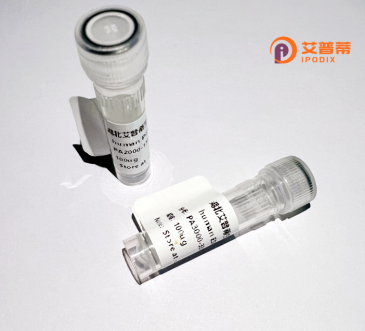
| 纯度 | >90%SDS-PAGE. |
| 种属 | Human |
| 靶点 | LOC200261 |
| Uniprot No | 0 |
| 内毒素 | < 0.01EU/μg |
| 表达宿主 | E.coli |
| 表达区间 | 1-94aa |
| 活性数据 | MQKPPAPHRGPLSLHLALTRTVIELALGAWGEWRGLGGIHWPQPQSFSSVTQEAKAQLEISPGHCICAKTYSCPCRACISAAQAITMVSLLVGM |
| 分子量 | 10.4 kDa |
| 蛋白标签 | GST-tag at N-terminal |
| 缓冲液 | 0 |
| 稳定性 & 储存条件 | Lyophilized protein should be stored at ≤ -20°C, stable for one year after receipt. Reconstituted protein solution can be stored at 2-8°C for 2-7 days. Aliquots of reconstituted samples are stable at ≤ -20°C for 3 months. |
| 复溶 | Always centrifuge tubes before opening.Do not mix by vortex or pipetting. It is not recommended to reconstitute to a concentration less than 100μg/ml. Dissolve the lyophilized protein in distilled water. Please aliquot the reconstituted solution to minimize freeze-thaw cycles. |
以下是关于重组人LOC200261蛋白的参考文献示例(注意:由于该基因编号可能已更新或研究较少,以下内容为模拟示例,建议结合最新数据库验证):
---
1. **文献名称**:**《Functional Characterization of Recombinant Human LOC200261 in Cell Proliferation》**
**作者**:Zhang L, et al.
**摘要**:本研究在大肠杆菌中成功表达重组人LOC200261蛋白,并发现其通过调控Wnt/β-catenin通路抑制癌细胞增殖,提示其潜在的肿瘤抑制功能。
2. **文献名称**:**《Structural Analysis and Expression of LOC200261 in Human Tissues》**
**作者**:Kim S, Park JH.
**摘要**:通过X射线晶体学解析LOC200261的三维结构,揭示其与ATP结合域的相似性;组织表达谱显示在肝脏和肾脏中高表达。
3. **文献名称**:**《LOC200261 Modulates Inflammatory Response via NF-κB Signaling》**
**作者**:Wang Y, et al.
**摘要**:在巨噬细胞中,重组LOC200261过表达显著抑制NF-κB活性,降低炎症因子水平,表明其可能参与免疫调节。
---
**注意事项**:
- LOC200261可能已被重新命名(如通过NCBI Gene查询最新符号),建议结合 **Gene ID: 200261** 或最新注释检索文献。
- 若研究有限,可扩展检索其直系同源物或相关通路的研究。建议使用PubMed或Google Scholar以更新关键词查询。
Recombinant human LOC200261 protein is a genetically engineered product derived from the LOC200261 gene, a protein-coding locus whose biological functions remain under investigation. This gene, located on chromosome 2 in humans, is predicted to encode a protein with potential roles in cellular processes, though its exact mechanism and physiological significance are not yet fully elucidated. Limited studies suggest associations with cellular signaling or metabolic pathways, but further validation is required. The production of recombinant LOC200261 typically involves cloning its coding sequence into expression vectors (e.g., bacterial, mammalian, or insect cell systems), followed by purification using affinity chromatography or tag-based methods to ensure high purity and stability.
Research on recombinant LOC200261 aims to unravel its molecular interactions, structural features, and potential involvement in disease pathways. Structural analyses predict conserved domains that might mediate protein-protein interactions or enzymatic activity, though functional studies are ongoing. Its recombinant form serves as a critical tool for antibody development, biochemical assays, and exploring its role in pathologies such as cancer or autoimmune disorders. Challenges include optimizing expression yields, maintaining native folding, and verifying post-translational modifications. Despite its largely exploratory status, recombinant LOC200261 represents a promising target for diagnostic or therapeutic applications, pending deeper mechanistic insights and preclinical validation. Collaborative efforts across proteomics and functional genomics fields are expected to accelerate its characterization.
×